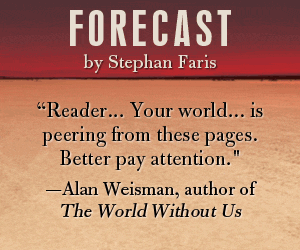Forecast: The global consequences of climate change
Introduction to a nine-part series
My interest in climate change came about in an unusual way. For most of the last decade, I had been paying peripheral attention to the warming of the world, reading about ice caps, polar bears and greenhouse gases. But as a reporter specializing in the developing world, I didn’t see a connection with myself or my work.
Then I visited the refugee camps just outside of Darfur. It was 2003 and I was on assignment to cover the beginnings of a conflict the U.S. State Department would soon call genocide. The stories the refugees told me — of torture, rape, murder — were threaded through with a common theme: the land envy of their attackers.
Even then it was clear to me that the conflict had environmental roots, that the schism on which the combatants broke had its origins in the long drought that gripped the area in the 1970s and 1980s, when the degradation of the region’s lands sparked fighting between farmers and nomadic herders.
But it was only later, while researching an article for The Atlantic magazine on the subject, that I discovered that climate scientists had traced the drying of Darfur to warming in the tropical and southern oceans. The same temperature pattern that some were saying was contributing to stronger hurricanes off the Gulf Coast of the United States had disrupted the African monsoons — with terrible consequences.
I started to pay more attention to global warming. If the emissions from our cars, factories and power plants had contributed to the violence in Darfur, what else were they responsible for?
Over the next few days, GlobalPost will be publishing extracts from my book, "Forecast: The Consequences of Climate Change, from the Amazon to the Arctic, from Darfur to Napa Valley," which tries to answer that question.
In addition to reporting from Darfur, "Forecast" takes readers to the Gulf Coast of the United States, where the fear of more violent storms is driving the middle class from their homes. In Europe, it shines a light on how immigration pressures, which will be heightened by climate change, threaten to transform the continent’s politics.
With reporting from Brazil and the American Southwest, it explores how global warming has the power to disrupt health care systems and facilitate disease outbreaks. A chapter set in Napa Valley looks at how rising temperatures are changing the taste of wine.
In the Arctic, "Forecast" examines the melting ice cap’s potential to unlock new shipping routes and redraw geopolitical boundaries. The final chapter, set in South Asia, asks what will happen as the same pressures that caused so much suffering in Darfur ramp up in a much more populated, more geopolitically important part of the world.
We’re entering a period of dramatic flux. Climate change, as I’ve discovered, isn’t something that’s happening in some distant location or far in the future. Its impacts stretch far beyond traditional environmental concerns, to directly affect our lives.
We’re knocking the world off balance. Since the beginning of human civilization, we haven’t seen a sustained shift in global temperatures of much more than a degree Fahrenheit up or down. None of the proposals being put forth in Washington, Brussels or in the international negotiations to find a successor to the Kyoto Protocol are aimed at halting the warming at less than about 3.5 degrees Fahrenheit.
What I’ve tried to do in "Forecast" — and part of what I’ll continue to do at Global Post — is explore and explain just what that means for the planet and for us.
Part 1: Why America Should Care
The Florida Keys are sinking
Can insurance cover the costs of climate change?
Who will be able to afford to live on the coast?
Part 2: The Spread of Disease
Pathogens find new habitats
Countries could backslide into poverty
How disease relates to carbon dioxide
Part 3: The Arctic Melt
Easier passage through the Arctic
A scramble for control of the Arctic
Opening the Arctic to damage
(Stephan Faris is the GlobalPost environment correspondent. You can buy his new book here: "Forecast: The Consequences of Climate Change, from the Amazon to the Arctic, from Darfur to Napa Valley.")

